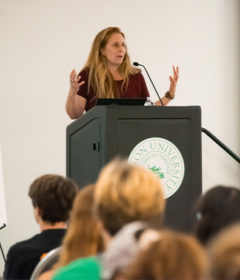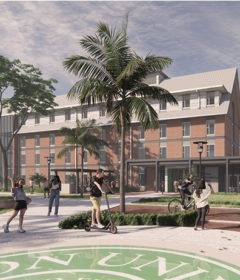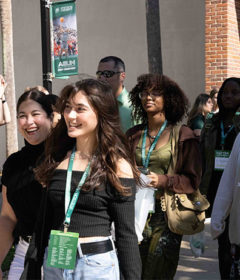Summer Research Hits Close to Home
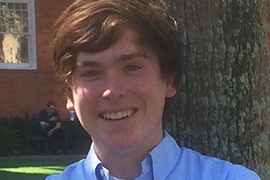
When Stetson senior James McNichols received a Summer Undergraduate Research Fellowship at the University of Florida, he decided to work with a researcher studying breast cancer.
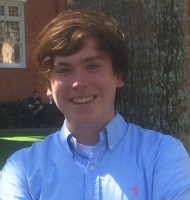
“For the past 10 weeks, I’ve been working in his lab with him trying to develop new drugs to treat what are called triple-negative breast cancers, which are some of the more aggressive and hard to treat,” said McNichols, a molecular biology major who worked this summer with UF’s Dr. Brian Law.
For McNichols, the research “hit close to home.”
“One of the reasons I decided on that lab was my mother battled breast cancer. Luckily, she came out on top and entered remission about a year ago now. My mom had triple-negative breast cancer, which is the exact type we were trying to develop these new drugs for,” said McNichols, who plans to become an ER trauma surgeon.
McNichols and fellow Stetson senior Samantha Arbour, a molecular biology major who plans to become an ob-gyn, were two of just nine students from across the United States and Puerto Rico accepted into the 2017 SURF program.
SURF, which concludes Friday, Aug. 4, is administered by the Department of Pharmacology and Therapeutics at UF’s College of Medicine in Gainesville.
“The SURF program is an exposure to working as a scientist, a researcher in an academic setting,” McNichols said. “We were doing full-time lab work, at the bench running experiments. It’s been a very eye-opening experience to expose myself to what scientists do on a day-to-day basis, to actually work with my hands and learn some techniques I plan on taking back with me to Stetson when I do my senior research in the fall.”
Both McNichols and Arbour will be doing cancer research as their respective senior projects this fall under Roslyn Crowder, Ph.D., assistant professor of biology. But, Arbour said, during the first day at SURF, program director Dr. Jeff Martens advised participants to “get outside of our comfort zone. That really stuck with me.”
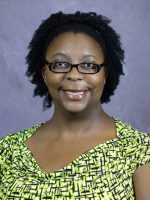
And so Arbour decided to pursue Parkinson’s disease research with SURF mentor Dr. Nikhil Urs.
“My experience has been really awesome,” Arbour said. “Monday we would set up for the week, and then Tuesday through Friday we’d do anything from cloning DNA, learning how to use the big console microscope that’s huge — it takes up a whole room – to reading papers and even teaching other SURF fellows how to do certain procedures. I really have learned a lot. It’s definitely been a rewarding program in lots of different ways.”
Added Stetson Professor Crowder, “While Stetson is great and allows students to have opportunities to do research, we are a teaching institution. I always think it’s a great balance to have students do research during the summer at a more research-intensive institution, so they can see the difference. I knew some of the techniques and things they would study during the summer would help them in their senior research projects they are going to work on in the fall semester with me.”
McNichols’ project will focus on the anti-cancer properties of ginger plants, while Arbour’s project will examine the anti-cancer properties of green tea in fighting leukemia.
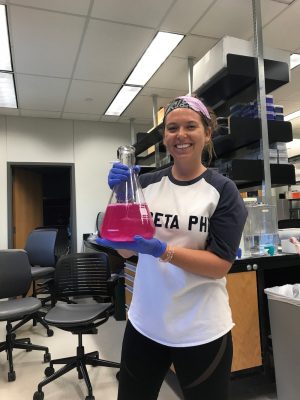
Both McNichols and Arbour believe their SURF experiences will help them during medical school.
“Although it’s a different side to medicine, SURF has a lot that can be transferred, especially following the scientific method,” McNichols said. “You make an observation, you make a question, you form a hypothesis and run some tests, analyze data and see if you need to change something or what you can do next.
“It’s almost exactly the same for when you’re a doctor. You see somebody’s ailments, you see their symptoms. Based on that, you make some sort of hypothesis about what it might be. From there you’ve got to run tests. Based on those tests, you gather the data and you analyze and you decide we go with this type of treatment, or maybe we need to run something else because something came back you didn’t expect.”
The cooperation McNichols witnessed among researchers, each with various fields of expertise, is something he expects will serve him well as a trauma surgeon.
“It was nice that just down the hall a couple of labs, there was somebody they (SURF mentors) or I could go to and ask questions and get their input,” he said. “And that’s very much what you have to do in an ER – you have to rely on one another and take everybody’s expertise and fuse it all together to get the best treatment.”
Arbour got a fuller appreciation of her SURF experience during, of all things, a wine tasting she attended in Gainesville.
“Someone asked me ‘What kind of research do you do?’ ” Arbour recalled. “I said ‘Parkinson’s disease research and some of the new drugs.’ The guy kept asking questions, so I kept going on and on and on. And afterward I thought to myself, ‘Wow, I know a lot more than I thought I did.’”
— Rick de Yampert

